Bounce- Bangalore
Bounce, Bangalore creates and delivers a smart transportation solution that makes regular commutes more efficient and less stressful.

Bounce, a Bangalore-based business, has become the world's fastest-growing bike-sharing start-up, clocking 60,000 trips per day, putting it on pace with global heavyweights like Lime and Bird, who rent out scooters. The Keyless bikes have not only replaced the keys, but the whole process of renting a bike has now been devoid of any physical or human interaction, thanks to a revolutionary technology that allows users to access the bike with just an OTP. Users may now pick up and drop off the bike wherever they like with Bounce's new One Way Rental option and be done with the ride. The goal is to provide metro customers with seamless first- and last-mile connections.
Bounce- Founder & Parent Company
Wicked Ride, Bounce's parent firm, was created by Vivekananda H R, Anil G, and Varun Agni in 2014. Its app allows customers to rent a scooter and drop it off at any legal parking location. Accessibility and cost, according to the company, have made it one of the "preferred" means of transportation for first- and last-mile connections, as well as daily commutes. During the current year, the corporation intends to introduce approximately 50,000 automobiles.
In Bengaluru, Bounce has surpassed a significant record of 60,000 rides per day, making it the world's fastest-growing bike-sharing start-up. The company has conducted over five million trips totaling 30 million kilometres in just ten months after debuting dockless scooters in Bengaluru. The company, which was valued at over $220 million in June after raising $72 million in a funding round, said it is scaling on par with global players such as Lime and Bird, both of which are based in the United States. "Without the contributions of each and every member of the Bounce community, both workers and users alike, this accomplishment would not have been possible," stated Vivekananda H R, chief executive, and co-founder of Bounce.
"We are slowly democratising mobility in India and transforming Bengaluru into a public transportation society," he continued. According to 2018 data from the Transport Department, Bengaluru has over 7.6 million private automobiles. The use of public transportation has steadily increased with the introduction of last-mile bike-sharing. With about 7,000 dockless scooters reaching an average distance of 7-8 km every trip, Bounce reached its 60,000 rides per day milestone. The firm claims that it is still one of the most cost-effective ways of transportation, with trips starting at Rs 5 per kilometre.
According to the research company, short-distance transportation start-ups have taken the mobility industry by storm recently, most notably with the growth of bike and scooter companies. Bikes and scooters, which allow individuals to travel shorter distances quickly, can assist commuters to reach public transportation hubs that are many miles distant. In the event of a pandemic, cost-cutting is essential. The key cause for the layoff and selling of motorcycles is the present political situation in the nation. The pandemic has wreaked havoc on a variety of enterprises, and India's overall economic condition is dire. As a result, the two-wheeler rental company has been forced to take such drastic steps. After laying off some top executives, the Sequoia Capital and Accel-backed business are now down to only the funders in senior positions.
Do you prefer a dockless scooter rental concept to a taxi model?
They discovered that the main issue statement in the taxi model was the driver cost after a debate on the virtues and economics of a bike taxi. This driver is a fungible resource, so they'll have to compete with other businesses for it, such as food delivery and e-commerce. Furthermore, it is already a well-established trend that drivers do not stay on these positions for lengthy periods of time.
In scooter taxis, the driver is not a convenience but a source of friction from all angles, for both as a company and for the consumer, who is sharing a small space with a stranger.
What is Bounce's most significant consumer value proposition?
In this case, customer service is entirely dependent on the client. You discover a ride, take it, and dump it off wherever without having to wait. You may even split the cost by riding together. What they're attempting to do is provide you the experience of owning a private automobile, but at a significantly lower cost. The average cost of travelling a kilometre by Bounce, for example, is Rs 6.50. When you share it, it just costs Rs 3.25. It's that simple. At this price, they also don't lose money. They may, at some time in the future, allow the opportunity for a user to share a trip with another commuter travelling the same route.


 Local BangaloreTeam
Local BangaloreTeam 










